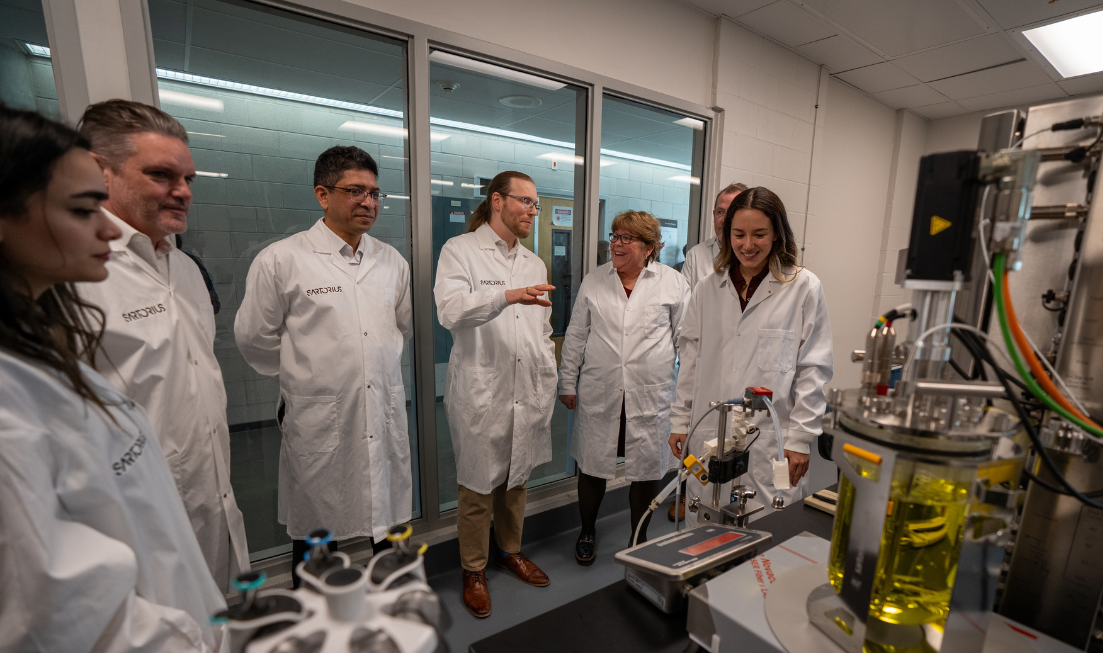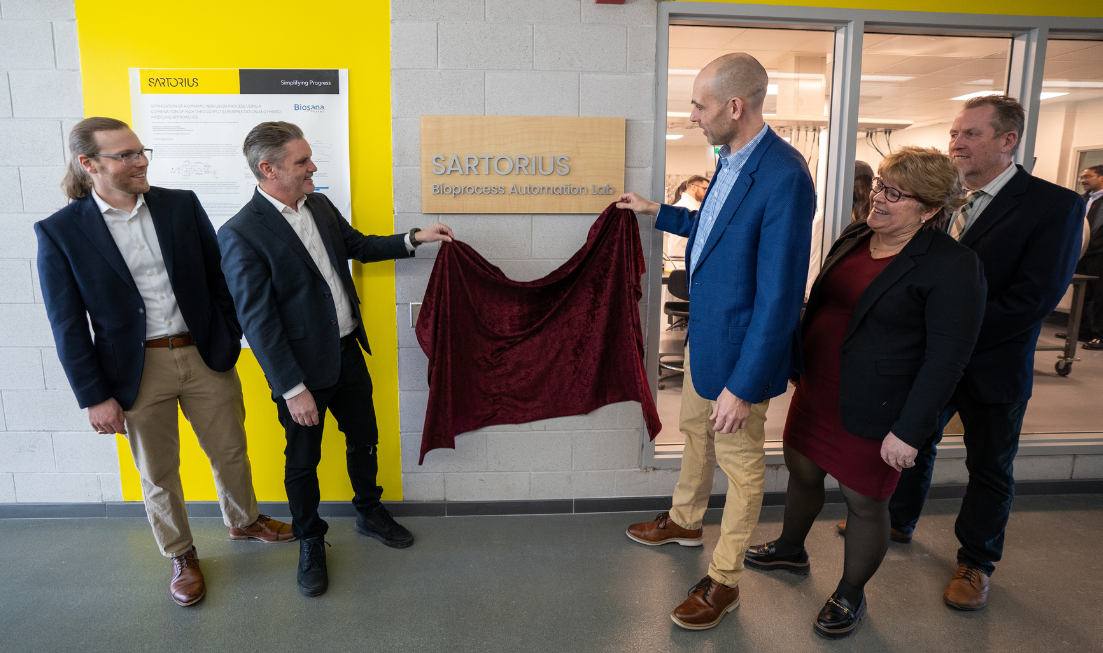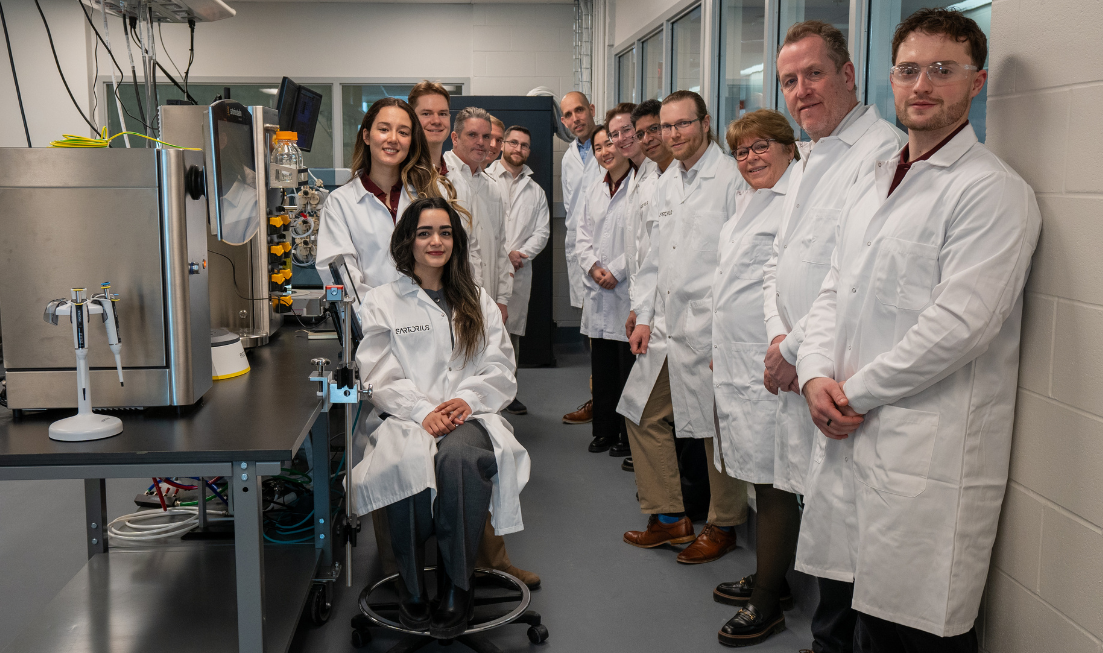Collaboration with Sartorius powers state-of-the-art biomanufacturing lab on campus

Researcher Brandon Corbett and Dean Heather Sheardown from the Faculty of Engineering chat at the opening of the Sartorius BioProcess Automotion lab on Tuesday. The lab, along with a significant contribution of biomanufacturing equipment from Sartorius, will support the development of biotherapeutics and improved access to life-saving treatments for chronic diseases. (All photos by Georgia Kirkos, McMaster University)
January 21, 2025
A new bioprocessing automation lab has opened on campus, thanks to a longstanding partnership with Sartorius — a leading international partner in life sciences research from the biopharmaceutical industry.
The state-of-the-art, 1,600-square-foot research facility complements a substantial contribution of advanced biomanufacturing equipment from Sartorius.

The Sartorius Bioprocess Automation Lab will serve as a training and development hub, where McMaster students and Sartorius employees can work with other industry partners to accelerate developments in bioprocess modelling, simulation and advanced control.
“The opening of the Sartorius Bioprocess Automation Lab marks a milestone in McMaster’s commitment to advancing biomanufacturing capabilities in Canada,” says Heather Sheardown, dean of the Faculty of Engineering.
“This generous contribution will support technological innovations in large-scale biotherapeutics manufacturing that enhance production efficiency and ultimately expand access to life-saving treatments for chronic illnesses such as autoimmune disorders and cancers.”
The partnership enables McMaster University and Sartorius to explore and industrialize innovative bioprocessing solutions together with partners from the biopharmaceutical industry, says Oscar-Werner Reif, chief technology officer at Sartorius.
“In this state-of-the art facility young researchers from academia and the industry will jointly develop innovative modelling and predictive control solutions that help to simplify and accelerate biomanufacturing processes — ultimately driving faster developments of improved therapies that will be accessible to patients around the world.”

Funding for the new facility comes via Stage 2 of the Biosciences Research Infrastructure Fund (BRIF) competition, the centrepiece of a $2.2 billion federal program developed to build a strong and resilient domestic biomanufacturing and life sciences sector.
The lab is the first BRIF-funded facility to open in Canada.
“In the crucial biomanufacturing field, the opening of this lab will help Canadian researchers secure the competitive advantage they need to maintain the prosperity, health and security of our country,” said Sylvain Charbonneau, president and CEO of the Canada Foundation for Innovation.
“With public and private sector support, this cutting-edge facility will help prepare the new generation of innovators.”
Building on these contributions, a team of McMaster researchers has secured additional Alliance Grant funding from the Natural Sciences and Engineering Research Council of Canada (NSERC) to launch an extensive four-year collaboration with Sartorius.
“We are deeply grateful to Sartorius for their generosity and vision,” says David Latulippe, an associate professor of chemical engineering and co-director of the Biointerfaces Institute at McMaster, and the principal investigator on the Alliance Grant.
“Training our graduate and undergraduate students on the highly specialized equipment in the Bioprocess Automation Lab is critical to the growth of Canada’s biomanufacturing economy, which is currently experiencing a severe talent shortage.”
The partnership between McMaster and Sartorius started in 2019, when Sartorius joined the McMaster Advanced Control Consortium (MACC).
In 2021, both partners teamed up to improve manufacturing processes of antibody and virus-based treatments for diseases such as COVID-19, cancers and genetic disorders. Since then, the company has continuously provided valuable training opportunities for students at its research and development facilities in North America and Europe.
About Sartorius
Sartorius is a leading international partner of life sciences research and the biopharmaceutical industry. With innovative laboratory instruments and consumables, the Group’s Lab Products & Services Division focuses on laboratories performing research and quality control at pharmaceutical and biopharmaceutical companies, as well as academic research institutes.


